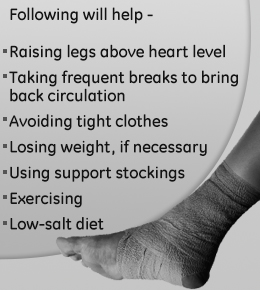Swollen ankles can be caused by either injury or due to the accumulation of excess fluid in the ankle joints due to certain diseases and conditions. Mentioned below are a few causes and cures for this condition.

Swelling of the ankles is a common condition, that can be related to either localized injury and infection, or some disease that affects the overall well-being of an individual. More commonly, swollen ankles are caused by the buildup of water or fluid in the ankle joints or the interstitial spaces, i.e. the spaces between the body cells or tissues. In medical science, this condition is known as
fluid retention or edema.
Causes of Swelling in the Ankles
- The most common reason for the swelling could be either a sprain or strain due to any injury.
- Infection is another common cause of this condition. When infection occurs in the tissues around the ankle joint, it is known as cellulitis.
- Septic joint is the term used to refer to the infection of the joint itself. Similarly, any injury to the posterior tibial tendon can also cause swelling and pain in the ankles. This condition is generally referred as ankle tendonitis.
- It is most common amongst people with diseases like gout, ankle arthritis, and rheumatoid arthritis.
- In many instances, poor blood circulation can cause ankle swelling.
- Women are particularly prone to suffer from this condition during pregnancy due to high blood pressure and preeclampsia. However, minor swelling can be attributed to the normal process, where the body is preparing for childbirth.
- Peripheral edema is another common condition associated with it.
- Certain kidney, liver or heart related diseases which cause excess accumulation of fluid in the legs and feet can result in swollen ankles.
Cure for Swollen Ankles
The treatment depends on the underlying causes. So, it is quite essential to visit a physician to properly diagnose the condition. Even if you know that a leg or ankle injury is the reason behind the swelling, it is better to consult an orthopedic doctor to find out the extent of damage. In case of a sprain or injury, it is very important not to put pressure on the injured ankle, instead you can use crutches to assist your movement. To get relief from the pain and discomfort, you can place your legs at an elevated level, usually above the level of your heart. Leg wedges can be used for this purpose too.
Other Treatment Options
- For ankle sprain, an ice pack can be used within 48 hours of injury for about 20 minutes at a stretch, which would provide great relief to the discomfort.
- Similarly, heat application can also ease the pain and swelling by stimulating blood flow to the affected area.
- Anti-inflammatory medications are sometimes prescribed in case of severe pain and swelling. If the swelling is mainly caused by poor blood circulation due to sitting and standing for a long time at a stretch, then avoid such activities. Also increase the muscle activity of the affected area, to improve blood circulation.
- If the swelling and inflammation persists for several days even after taking sufficient care, then the condition may require medical attention by a professional.
- As mentioned already, it can be caused by various diseases, including liver and kidney diseases, edema, arthritis, and congestive heart failure. In such a situation, different medications may be required for the treatment to target the specific cause.
- In the meantime, drink plenty of water, minimize salt intake, and avoid laxatives, alcohol and cigarettes.
So, basically one can see that the treatment options can vary considerably, depending on the underlying cause. Hence, proper treatment would require detection of the factors responsible for this condition itself. Therefore, if the situation does not improve within a few days, consult your physician to find out if any major disease is causing the ankle swelling.


 Swelling of the ankles is a common condition, that can be related to either localized injury and infection, or some disease that affects the overall well-being of an individual. More commonly, swollen ankles are caused by the buildup of water or fluid in the ankle joints or the interstitial spaces, i.e. the spaces between the body cells or tissues. In medical science, this condition is known as fluid retention or edema.
Swelling of the ankles is a common condition, that can be related to either localized injury and infection, or some disease that affects the overall well-being of an individual. More commonly, swollen ankles are caused by the buildup of water or fluid in the ankle joints or the interstitial spaces, i.e. the spaces between the body cells or tissues. In medical science, this condition is known as fluid retention or edema.